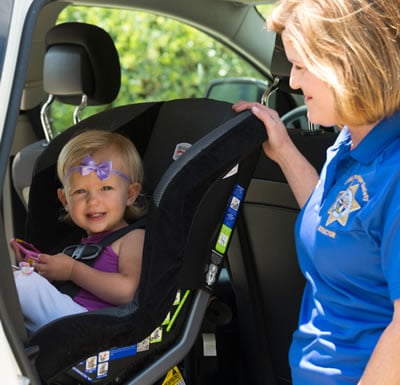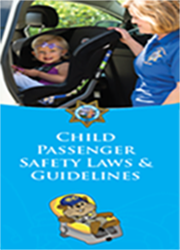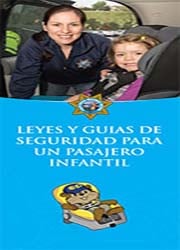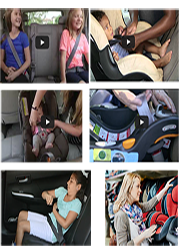Child Safety Seats

Buckling up is the single most effective thing you can do to protect yourself and your passengers in a crash. It is extremely important to make sure all children riding in your car be properly secured before every trip.
Thousands of children are injured or killed every year because their child passenger safety seats are not installed properly. Remember, most collisions occur within a mile of the home - so buckle your child in a safety seat for every trip, no matter how short.
If you're not confident of how to properly secure your child in a safety seat, contact your local CHP Area Office, and ask to speak with a child passenger safety technician. Click on this link to locate a local Area Office anywhere in California.
California Law
 Current California Law:
Current California Law:
- Children under 2 years of age shall ride in a rear-facing car seat unless the child weighs 40 or more pounds OR is 40 or more inches tall. The child shall be secured in a manner that complies with the height and weight limits specified by the manufacturer of the car seat. (California Vehicle Code Section 27360.)
- Children under the age of 8 must be secured in a car seat or booster seat in the back seat.
- Children who are 8 years of age OR have reached 4’9” in height may be secured by a booster seat, but at a minimum must be secured by a safety belt. (California Vehicle Code Section 27363.)
- Passengers who are 16 years of age and over are subject to California's Mandatory Seat Belt law.
When can a child graduate to a booster seat?
California law does not address graduation time from a five point harness to a booster seat. In the interest of safety, do not rush to move a child into a booster seat before they’re ready. Each time you “graduate” your child to the next seat, there’s a reduction in the level of protection for your child. Keep your child in each stage for as long as possible.
A child is ready for a booster seat when they have outgrown the weight or height limit of their forward-facing harnesses, which is typically between 40 and 65 pounds. Read the forward-facing car seat’s owner’s manual to determine height and weight limits, and keep your child in a harnessed seat for as long as possible.
Children at this stage are not yet ready for adult safety belts and should use belt-positioning booster seats until they are at least 4’9″ and between 8 and 12 years old. Safety belts are designed for 165-pound male adults, so it’s no wonder that research shows poorly fitting adult belts can injure children.
Useful Links Related to Child Passenger Safety
The Children's Hospital of Philadelphia, Videos, and Information: Car Seat Safety by Ages
American Academy of Pediatrics Recommendations, Video, Rear Facing to Two Years of Age
California Department of Public Health, Car Seat Basics, Choosing and Using a Car Seat
Top Tips to Keep Kids Safe, The Ultimate Car Seat Guide



